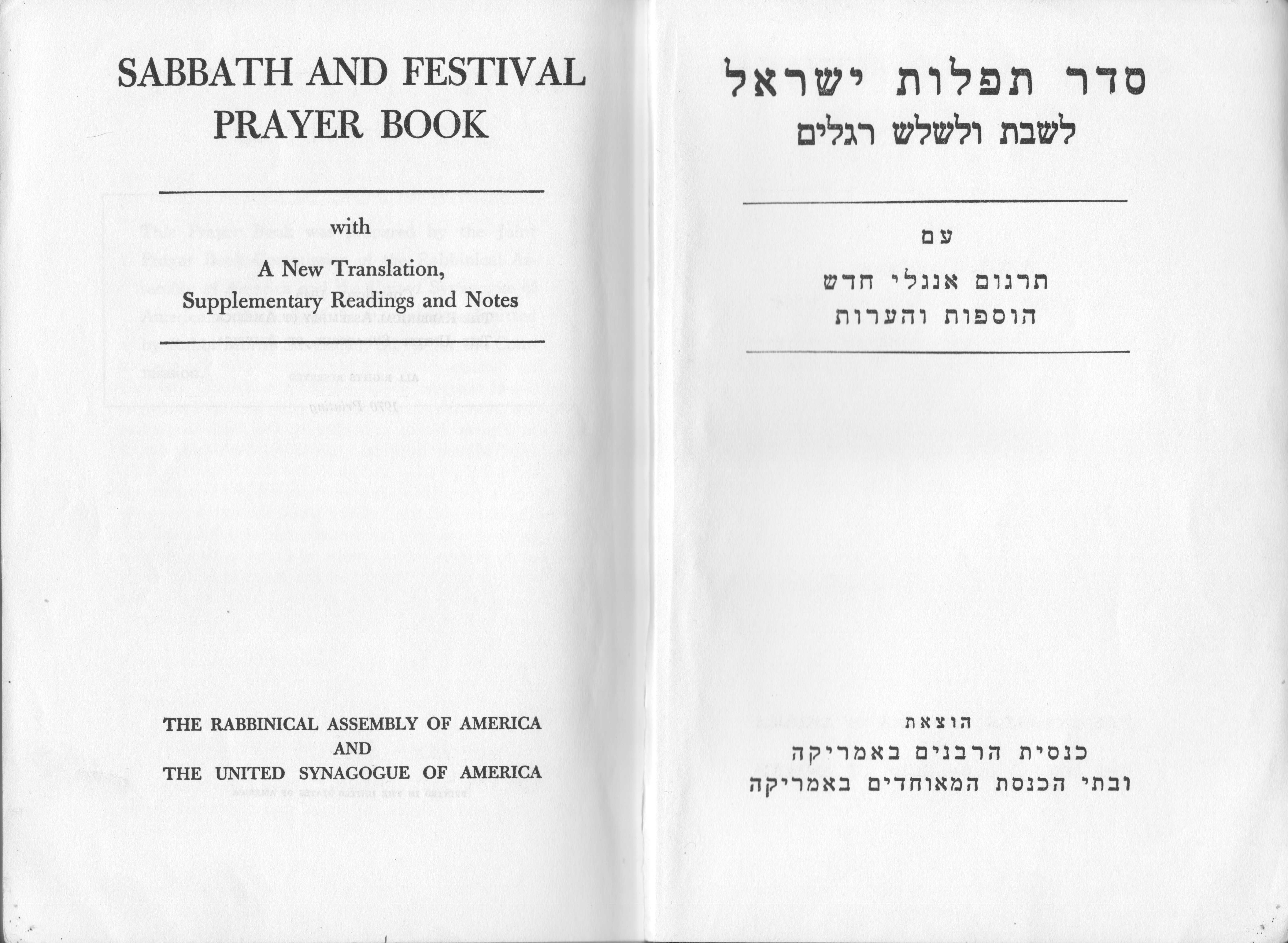
This work is in the Public Domain due to the lack of a copyright renewal by the copyright holder listed in the copyright notice (a condition required for works published in the United States between January 1st 1924 and January 1st 1964).
This work was scanned by Aharon Varady for the Open Siddur Project from a volume held in the collection of the Varady family, Cincinnati, Ohio. (Thank you!) This work is cross-posted to the Internet Archive, as a repository for our transcription efforts.
Scanning this work is the first step in a more comprehensive project of transcribing each prayer and associating it with its translation. You are invited to participate in this project!
This Festival Prayer Book is the first of a series planned by the United Synagogue of America to meet the needs of the Congregations affiliated with it, and of American Congregations in general. It is hoped that the series will eventually provide for all occasions of public worship in the Jewish year.
Practical considerations prompted the United Synagogue to make the first of its liturgical publications a one volume edition of the service for the Three Festivals, Passover, Pentecost and Tabernacles. The only prayer books with adequate English translation hitherto available to the American public, assigned to each Festival a separate volume. This necessarily made the set unwieldy in bulk and expensive in price. The result has been that whilst worshippers have supplied themselves, for the most part, with the official prayer book used by their Congregations on the Sabbath and the High Holy Days, no such uniformity has prevailed in the case of the Festivals.
It is one of the chief aims of the United Synagogue to endow the traditional Jewish service with all the beauty and dignity befitting it and inherent therein. With this end in view, especial care has been given, not only to the production of a correct text, but to such an arrangement of the text as will best express the prose or poetry of a liturgical composition. The Psalms and Piyyutim (hymns of the traditional liturgy) are, for the first time in any published Jewish ritual, clearly differentiated by the arrangement of lines and stanzas from the prose portions of the service. Piyyutim or appropriate hymns for the various Festivals have been selected from the wealth of material with which the traditional liturgy abounds in accordance with similar usage in some of the older communities of Europe and more particularly on the basis of the service arranged by Dr. Solomon Schechter for the synagogue of the Jewish Theological Seminary of America.
The English prose translation, while naturally drawing upon the better versions now in use, has not slavishly adhered to any of these, when in the judgment of the editor or the committee, a better rendition could be found. For the beautiful metrical translations of the Piyyutim, the committee gladly acknowledges its indebtedness to Messrs. George Routledge & Sons, through whose kind offices consent was obtained to include in the present volume the translations by Israel Zangwill, Nina Salamon and Elsie Davis, now to be found in “The Service of the Synagogue,” and it also wishes to express its indebtedness to Rabbi Joseph Marcus for his kind permission to include his metrical translation of the Akdamut.
There are certain other features of the prayer book which will facilitate its use in many congregations, to which attention should be called. In many cases, the text is so arranged and spaced as to allow for responsive reading. A prayer for the Government of the United States, has been formulated both in Hebrew and in English, which is not a mere rephrasing of the prayers used in monarchical countries, but aims to reflect the spirit of republican institutions and aspirations.
Recognizing a widely prevalent custom, two English prayers have been inserted, one to be recited before the Ark when the Scrolls are taken out, and another suitable for reading before the mourner’s Kaddish. All the readings from the Torah and the Prophets have been included in the prayer book and are provided with a separate index. The translation of these lessons as well as of the Scriptural passages cited in the prayers, is taken from the new Bible translation by the Jewish Publication Society of America. It has been found most convenient to place the Piyyutim for the particular Festivals in an appendix, so that there may be no breaks in the sequence of the prayers common to all Festivals. Full and specific directions refer in the proper place to the appropriate selections. The chief divisions of the service from the Introductory Hymns to the Piyyutim have been clearly indicated, both in the body of the prayer book and in the index. The committee hopes that this will make it possible for certain congregations which have introduced a somewhat abridged service to make their selections on the basis of the traditional prayer book rather than to have recourse to other rituals.
The committee takes this opportunity to express its great indebtedness to the editor of the prayer book, Doctor Maurice H. Farbridge. To him fell not alone the onerous task of carrying out in detail the general plans of the committee, but of seeing the whole work through the press to its final completion. Many a felicity in translation and in the arrangement of the Hebrew text is due to his scholarly initiative, judgment and good taste. The committee deems itself fortunate in having obtained his valuable services.
Alexander Marx, Chairman
Jacob Kohn, Secretary
Louis Ginzberg
Elias L. Solomon
Samuel M. Cohen

“מחזור לשלוש רגלים (אשכנז) | Maḥzor l’Shalosh Regalim: Festival Prayer Book, arranged and translated by the United Synagogue of America (1927)” is shared through the Open Siddur Project with a Creative Commons Public Domain Dedication 1.0 Universal license.










Leave a Reply